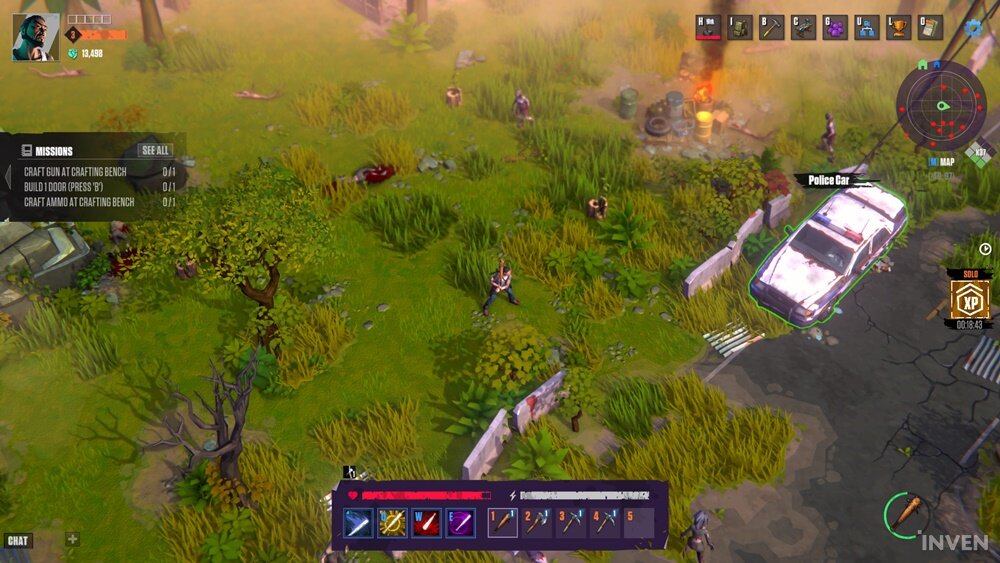Although categorized as an MMORPG, this game draws closer to the sandbox survival genre, deviating from the norm with its narrative structure. Within the game, there are no NPCs, quests, or separate storylines. Instead, one encounters characters from the original drama series, a world reduced to ruins, and the relentless threat of zombies, or "walkers." In this desolate setting, the sole objective for players is survival itself.
Imprinting a Post-Apocalyptic Sandbox Survival

As you initiate the game, characters from the original drama cross paths with the player. From protagonists like Rick and Glenn to pivotal figures like King Ezekiel, a diverse cast comes alive in various ways. Yet, the freedom to select any desired character from the outset is not granted. Initially, the choices are limited to a mere five characters, such as Kenji, Joy, and Sonia. To access other characters, one must either draw from character packs or acquire them from fellow players.
Each character boasts a unique skill tree. Categorized as Brawlers, Raiders, or Survivalists, players can tailor their choices to their preferred playstyle. Those inclined toward cooperative play or zombie combat might favor Sonia, a Survivalist with skills specialized for combat situations. On the other hand, if a more aggressive approach to combat is sought, Kenji could be the optimal choice.

However, this doesn't imply Sonia is weak in combat. With two distinct skill trees available, players can create combinations that align with their gameplay style or compensate for shortcomings when collaborating with others.
The game's enjoyment can be divided into three main avenues. Firstly, survival is paramount. Commencing the game places players in random locations, devoid of resources. Gathering materials like stones and wood scraps is necessary to craft essential gear and establish headquarters (HQ) for survival.
As the HQ level increases, the range of craftable items expands. However, this process isn't effortless. While collecting materials is straightforward, upgrading HQs requires fending off relentless zombie assaults. While not insurmountable, this challenge necessitates thorough preparation to defend HQs against incoming zombie hordes.


Survival remains an ongoing element. Every item, apart from basic materials, has durability, rendering them impermanent. Melee weapons degrade with every strike against zombies, armor weakens with each hit endured. Axes and pickaxes designed for harvesting resources follow the same pattern. Continual movement becomes indispensable to endure the unforgiving world.
While such actions might appear trivial, they form the cornerstone of the survival genre. This isn't a metaphorical notion. 'The Walking Dead: Empires' focuses on character development through skill trees, talents, and masteries.

If skill trees augment attributes like melee damage or health, talents and masteries offer broader prospects. Talents raise the cap on item tier levels, allowing players to craft higher-grade items. Elevating melee weapon talents permits access to superior melee weaponry. Melee combat-oriented players should raise talent levels for melee weapons, food & meds, and gear, while crafting-oriented players should raise talent levels for crafting and tools.
Masteries resemble a form of proficiency. Chopping wood or mining rocks elevates mastery levels for each resource, subsequently boosting collection speed. Engaging zombies in battle consistently enhances mastery levels against larger zombies, resulting in higher damage dealt. A combination of talents and masteries facilitates character specialization.

Enhanced Enjoyment in Unity

Combatting zombies is an indispensable facet. Amid the challenges of survival and resource collection, players inevitably encounter zombies. Engaging in combat with these creatures becomes a recurrent activity. Confronting zombies offers two notable benefits. The first is survival and resource accumulation. While addressing immediate threats, players can gather essential materials. Naturally, this serves as a fundamental motive.
The most significant incentive is the ranking system, leading to the accumulation of 'Dead Coins,' a utility token. Though the utility of Dead Coins during the open beta phase was limited, observing the practices in other Gala Games titles suggests potential for NFT purchases or revenue generation using these tokens.

The final source of enjoyment in 'The Walking Dead: Empires' is alliances. While players have to start solo to gather resources, create equipment, and combat zombies, collaboration becomes essential as they progress. At a certain stage, individual efforts alone may prove insufficient. This is where trusted companions come into play. Initially, cooperation feels akin to being part of a simple party, but as numbers grow, the formation of bigger alliances becomes feasible.
An alliance transcends being a mere collaborative community. Sometimes, it evolves into dominance. It's often said that the most formidable adversary is another human. Just like in the original drama series, where the protagonist's group encounters numerous other factions, 'The Walking Dead: Empires' follows a similar path. Even within one's alliance, exerting pressure on other survivors can be necessary at times. To survive, alliances must form on both sides. In the shattered world, excluding oneself and their alliance, everyone else is essentially a foe.
While alliance features were not fully accessible during the open beta phase, given the game's support for PvP, alliances are anticipated to compete in the future, serving as factors for Dead Coin mining or acquiring materials for specific items.
Token mining primarily occurs in two ways: competing for Dead Coins, as mentioned earlier, or selling items as NFTs. While mining Dead Coins through competitive content is accessible to all players who enjoy the game, creating valuable items for profit is likely necessary to yield substantial returns. However, considering the open beta stage, the feasibility of monetizing Dead Coins wasn't fully explored, thus making it premature to gauge profitability.

As a sandbox survival MMORPG, 'The Walking Dead: Empires’ presents an intriguing proposition. It remains faithful to the survival genre's defining elements. This isn't just another game borrowing 'The Walking Dead' IP; it's a manifestation of the contemplation surrounding how to craft a sandbox survival experience. While areas requiring further improvement were evident during the open beta phase, players who have an affinity for sandbox games like Minecraft will likely find satisfaction in this title.
